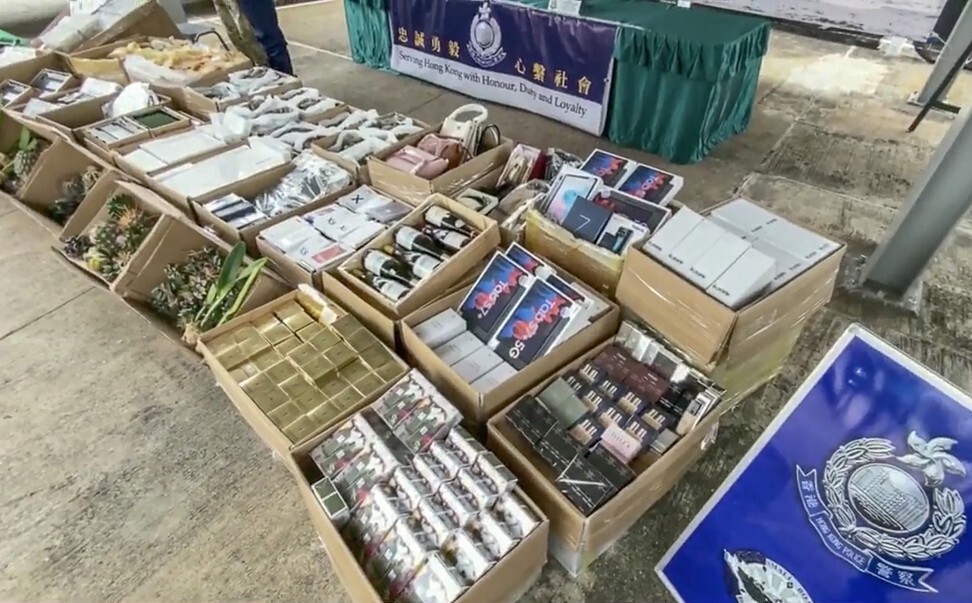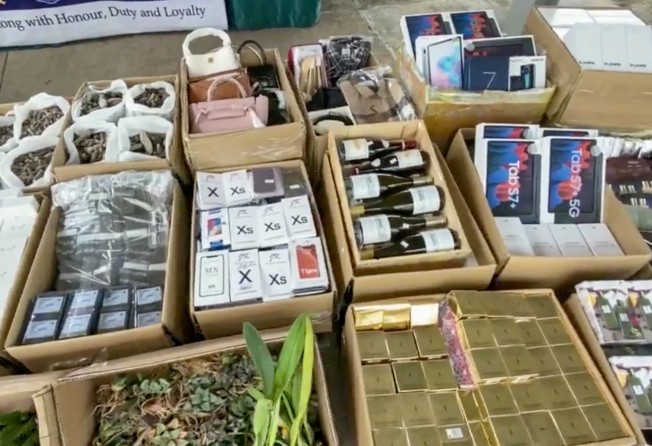
Hong Kong customs links surge in value of sea-smuggling seizures to Covid-19 travel curbs
- More than HK$380 million worth of goods seized from maritime smugglers so far this year, a 138 per cent increase on figure covering all of 2019
- Official says imposition of compulsory quarantine, checkpoint closures are fuelling smuggling market

A Hong Kong customs official has linked a 138 per cent surge in the value of confiscated contraband to coronavirus travel restrictions, as he revealed sea-smuggling seizures worth more than HK$380 million (US$49 million) so far this year.
The latest figure, covering 58 cross-border cases, was disclosed after police and customs officers seized HK$12.5 million worth of goods when they arrested a Hong Kong man during a Tuen Mun operation on Monday night.
Assistant Superintendent Danny Cheung Kwok-yin, the head of customs’ marine investigation division, said smugglers were capitalising on the quarantine-related reluctance of mainland Chinese shoppers to visit Hong Kong and moving products over the maritime border without paying taxes.
Of Monday’s bust, Cheung said about 300 orchid and cactus plants with an estimated value of HK$150,000 were among the seized items.
“It is the first time since 2018 that the illegal export of plants was detected in a cross-border smuggling operation,” he said.
Cheung said the orchids and cactuses came from Japan and South America respectively, with each plant worth as much as HK$3,000.
He said global Covid-19 restrictions meant people could not travel across borders to buy such plants. Strong demand in mainland China for the products had therefore created a market for cross-border maritime smuggling, Cheung added.
At about 11pm on Monday, 11 men were seen moving boxes of goods from a truck onto a speedboat equipped with four outboard engines berthed at a Lung Kwu Tan pier.
When officers moved in, 10 of the suspects fled via the speedboat in the direction of the mainland city of Shenzhen. The eleventh suspect, a 44-year-old man who failed to jump onto the boat in time, tried to escape using the truck, but was intercepted and arrested in the vehicle.

Seventy-eight boxes of goods worth HK$12.5 million were seized on board the truck.
In addition to the seizure of the plants, HK$7.3 million worth of electronic goods were confiscated, along with cosmetic products, dried seafood, clothing, handbags and a box of white and red wine.
Officers believe the items were bound for buyers in Guangdong, Guangxi and Hunan provinces.
The 44-year-old Hongkonger was arrested for attempting to export unmanifested cargo – an offence that carries a maximum penalty of seven years in jail and a HK$2 million fine. He was released on bail pending further investigation.
The seizure of the plants came after customs officers seized pets and expensive alcohol in anti-smuggling operations earlier this year.
Between the start of the year and October 6, the total value of items seized in 58 cross-border maritime smuggling cases reached HK$385 million.
That represents a 138 per cent rise on the previous figure of HK$162 million covering all of last year. Customs officers seized HK$151 million worth of contraband in 62 cases in 2018.
Cheung said mainland visitors had not been coming to Hong Kong to shop because of the 14-day quarantine orders and the closure of major border checkpoints in place to counter the Covid-19 pandemic.
He added smuggling syndicates had taken the opportunity to help buyers from other parts of China to smuggle their purchases across the border to escape mainland tariffs.
The Post has learned that maritime syndicates could pocket between HK$300,000 and HK$500,000 for each illegal shipment, using powerful speedboats to transport the contraband across the border.